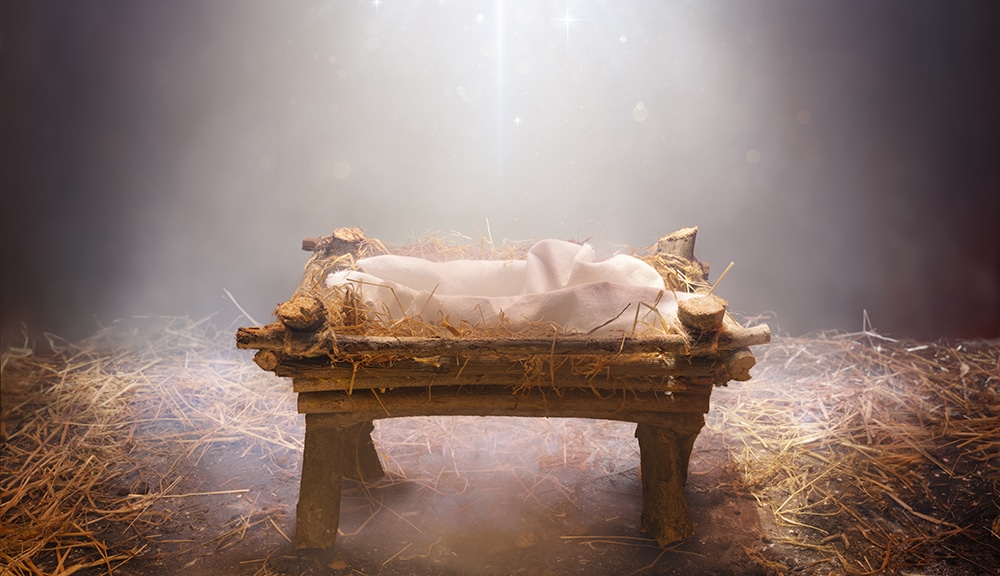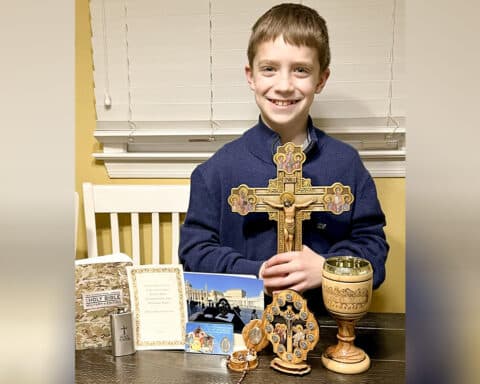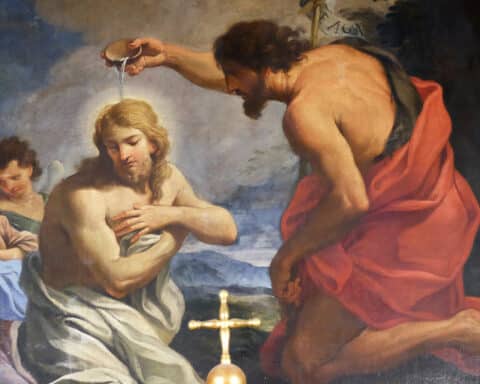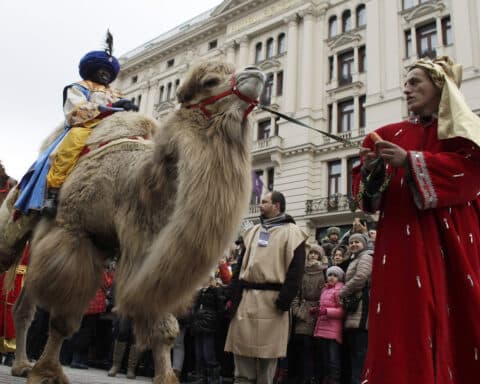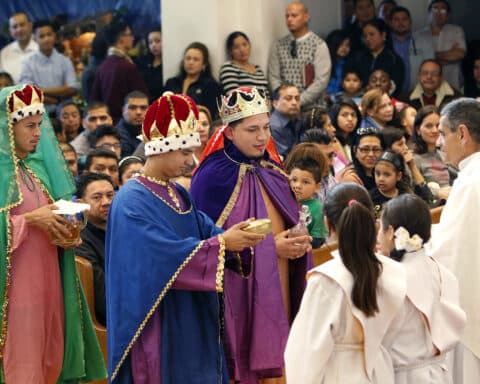The question at Christmas is not about whether God will act for us. The babe born of Mary is the answer: God has given everything. The question is really about us. Will we receive Christ?
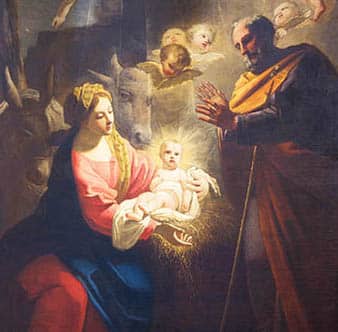
This is a most magnificent reversal, and a most perilous one. He in whom all things are created — in whom we live and move and have our being — is given into our hands. The host has become the guest, and we, who depend on God for all things, are called upon to become his host.
Christmas is not only a time of great consolation, but the beginning of the great decision. God is all in. But do we accept him? Everything depends on our answer.
The danger of Christmas
It is not typical to muse on the parable of the sower during Christmas, but it should be. “A sower went out to sow his seed,” and the seed falls upon all manner of earth: some along a path, some on rock, some among thorns, and some into good soil (Lk 8:5-8). Jesus told this parable to “a large crowd” (Lk 8:4). He then goes on to explain the meaning of his parable, but not to everyone. He opens the meaning to “his disciples [who] asked him what the meaning of this parable might be” (Lk 8:9).
To his disciples, Jesus teaches that the seed is the word of God. The seed that falls on the path is not guarded, so it gets trampled underfoot and eaten by birds: these are the ways in which the seed is not received deeply and thus subject to the snares of the devil. The seed that falls on the rock cannot lay down roots, even if it is initially received with joy: this is how what seems like faith appears for a time but then passes away because it is superficial. The seed that falls among thorns has to compete with myriad other desires and preferences and interests: this is how the lack of prioritization deprives the word of the nutrients it needs to grow. But the seed that fell on good soil is the word of God that finds a generous reception, that is nurtured “in a generous and good heart” and brings forth “fruit through perseverance” (Lk 8:15).
There are at least two things that we should not miss about Jesus’ parable.
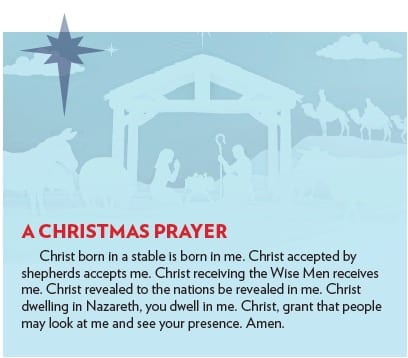
The second thing we dare not miss is the little detail about to whom, exactly, Jesus offered the further explanation after the parable. Remember, the parable was given to “a large crowd,” comprised of many different people “from one town after another” (Lk 8:4). The explanation, though, is not given to the crowd but to his disciples, who asked him what this parable meant (cf. Lk 8:9). Who are the disciples, then? They are the ones who seek to understand. They have heard his word, but they struggle to know it. By asking him to teach them, they are seeking to allow the word to sink in deep. They are becoming good soil. They are receiving him. The evidence of their hearing well will show forth in how they act on his word (cf. Lk 8:21; 11:28).
The parable of the sower inclines us to reckon with the dangerous side of Christmas. God has given his Son. The question is, will we receive him? Receiving him is not about fleeting seasonal gladness or setting him alongside many other things. Receiving him is about giving him pride of place, and allowing him to set down roots and bear fruit in our lives. Receiving him is about being his disciples — the ones who seek to know him and who struggle to understand him. This is indeed the dangerous reversal: He is the guest who calls us to become his hosts, and everything depends on our hospitality.
The joy of Christmas
The Lord of all comes to us wrapped in swaddling cloths and lying in a manger. This is God’s great proposal — his knock upon our door. He would not force his way into our world or into our lives. He has come meekly. And to our credit, some of our number received him with great care. This is part of our reason for joy at Christmas, and the during the Christmas Octave, the Church schools us in the memory of this joy.
The Nativity of the Lord
“Now there were shepherds in that region living in the fields and keeping the night watch over their flock. The angel of the Lord appeared to them and the glory of the Lord shone around them, and they were struck with great fear. The angel said to them, ‘Do not be afraid; for behold, I proclaim to you good news of great joy that will be for all the people. For today in the city of David a savior has been born for you who is Messiah and Lord.'”
— Luke 2:8-11

The shepherds act upon what they have heard but do not yet understand. Their initial response to the good news is to draw nearer (cf. Lk 2:16). The next response is to proclaim what was made known to them about the child (cf. Lk 2:17). And their final response is to return from whence they came, but now “glorifying and praising God for all they had heard and seen” (Lk 2:20).
They hear, they seek after, they bear fruit. They rejoice at the coming of Christ.
The Feast of the Holy Family
“When Joseph awoke, he did as the angel of the Lord had commanded him and took his wife into his home. He had no relations with her until she bore a son, and he named him Jesus.”
— Matthew 1:24-25
“[Jesus] went down with them and came to Nazareth, and was obedient to them; and his mother kept all these things in her heart.”
— Luke 2:51
God found a friend in his servant, Joseph. Here was a man who would wait upon the word of the Lord, following neither his own impulses nor the conventions of his day, but instead would obey the command of the Lord first of all. Because of Joseph’s obedience, the Son of the Most High humbled himself to take cover under the name of Joseph, while the mystery of Mary’s motherhood was protected under the spousal care of her most chaste spouse.
Mary opened her heart to the mystery of this child, whose origin she both knew and did not know. From the time the angel came to her, she pondered the word of the Lord (cf. Lk 1:29, 2:19, 2:35, 2:51). Upon first receiving the word of God, she “set out and traveled to the hill country in haste” (Lk 1:39) and there proclaimed the glory of the Lord (cf. Lk 1:46-55). She is the best of soil to whom the word of God comes: ready, attentive, responsive, fruit-bearing.
It was in the household of Joseph and Mary that “Jesus advanced [in] wisdom and age and favor” (Lk 2:52). He grew from Joseph’s obedience, from Mary’s pondering and sacrifice. Their regard for one another and for their son, in fidelity to the Lord, created the culture in which the Son of the Most High was first received into this world. This was a family cultivated by two people who were — as St. Paul later hymned — patient and kind, not jealous or boastful, not arrogant or rude; they “[bore] all things, [believed] all things, [hoped in] all things, [endured] all things” (cf. 1 Cor 13:4, 5; 1 Cor 13: 7).
The Feast of the Holy Innocents
“A voice was heard in Ramah, sobbing and loud lamentation; Rachel weeping for her children, and she would not be consoled, since they were no more.”
— Matthew 2:18; cf. Jeremiah 31:15
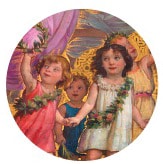
These infants were the most vulnerable: all they could do was receive. They would receive from others either care or cruelty, kindness or callousness, nurturing or neglect, what was good or what was evil. From Herod, their ruler, they received the sentence of death because of his hardness of heart and irascible pride. But the Lord hears the blood of victims crying out to him from the ground (cf. Gn 4:10). They are gathered up in Christ’s sinless sacrifice when the time comes. In him, their memory through the memory of the Church by the witness of the Gospel and the work of the liturgy. They received the Lord by their blood.
Along with these holy innocents, Christ claims all the poor, the lowly, the victimized, and the exploited as his own. As St. Oscar Romero preached, they are the ones who truly rejoice at the coming of Christ: “No one can celebrate a genuine Christmas without being truly poor. The self-sufficient, the proud, those who, because they have everything, look down on others, those who have no need even of God — for them there will be no Christmas. Only the poor, the hungry, those who need someone to come on their behalf, will have that someone. That someone is God, Emmanuel, God-with-us. Without poverty of spirit there can be no abundance of God” (Homily of St. Oscar Romero on the Fourth Sunday of Advent).
Epiphany
“And behold, the star that they had seen at its rising preceded them, until it came and stopped over the place where the child was. They were overjoyed at seeing the star, and on entering the house they saw the child with Mary his mother. They prostrated themselves and did him homage.”
— Matthew 2:9-11
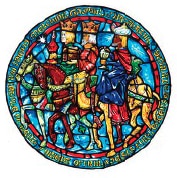
What is more important than ascertaining precisely who they are is noticing what they do. They fall down and worship. With whatever wisdom they possessed — whether natural or unnatural, trustworthy or illusory — they come seeking “the newborn king of the Jews” (Mt 2:2). Their reading of the stars has led them to seek after understanding, and they have come to find him who is the reason for the appearance of the star that has disrupted their study. Their own ways have been disturbed, and they take notice.
As Benedict XVI concludes: “The key point is this: the wise men from the east are a new beginning. They represent the journeying of humanity toward Christ. They initiate a procession that continues throughout history. Not only do they represent the people who have found the way to Christ: they represent the inner aspiration of the human spirit, the dynamism of religions and human reason toward him.”
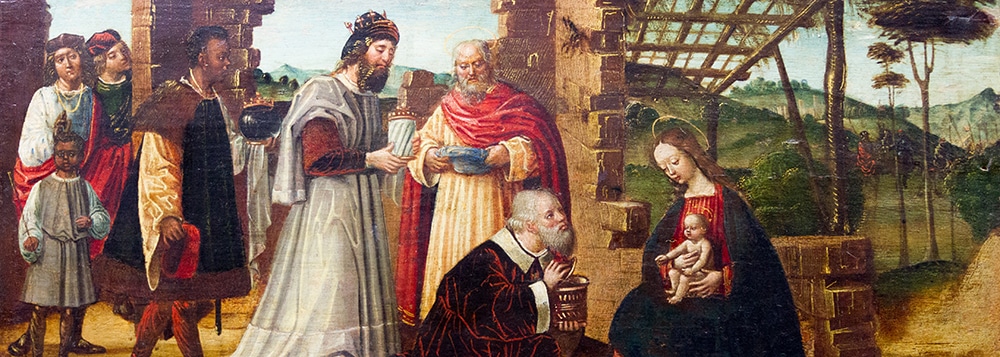
The star in the East appeared in the sky for all to see, but it is these Magi who, following it, “have come to do … homage” to the one to whom the star leads (Mt 2:2). Like the disciples who asked Jesus what the Parable of the Sower meant, the Magi have stepped out of the crowd in their desire to let the meaning of this sign change them. They pass right by the arrogant ruler puffed up on his own understanding — Herod — as they persist in seeking the one worthy of their worship.
Baptism of the Lord
“I am baptizing you with water, but one mightier than I is coming. I am not worthy to loosen the thongs of his sandals. He will baptize you with the holy Spirit and fire.”
— Luke 3:16
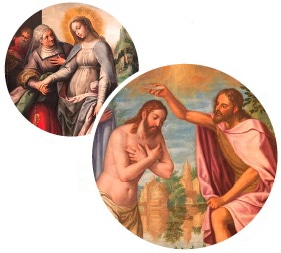
Welcoming the Lord is a costly sacrifice for John as an adult. When he was a child in his mother’s womb, he had nothing of his own. But as a grown man, he has a following; he has realized success in his ministry; he is a man of influence. There are many thorns that could prevent John from welcoming the Lord. Indeed, welcoming the Lord now means prioritizing the one truly necessary thing, and relativizing everything else. He receives the Lord under his hands, he does his part, then he gives Jesus priority. He chooses joy in choosing Christ.
Presentation of the Lord (Candlemas)
“And Simeon blessed them and said to Mary his mother, ‘Behold, this child is destined for the fall and rise of many in Israel, and to be a sign that will be contradicted (and you yourself a sword will pierce) so that the thoughts of many hearts may be revealed.'”
— Luke 2:34-35
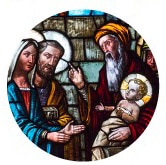
The joy of receiving him, though, is again tied with the danger of his arrival. Now is the time when the true character of each heart is laid bare, because the presence of Jesus forces a decision.
In the Book of the Prophet Isaiah, the Lord speaks confounding words through the prophet to his people. At one point, the Lord instructs Isaiah to prophesy that: “[The Lord] shall be a snare, a stone for injury, a rock for stumbling to both the houses of Israel, a trap and a snare to those who dwell in Jerusalem; and many among them shall stumble; fallen and broken; snared and captured” (Is 8:14).
God himself is here the rock upon which men stumble and fall. By the words of Simeon, Jesus, who is God’s living word and the presence of God’s saving action, is the one upon whom rising and falling will be determined. Against him, illusions will disperse and the truth will remain. He is the one who draws out the secrets hidden in the hearts of many. Why? Because everything depends on whether people will welcome him or reject him. In Jesus, God has made himself the guest and put us in the position of host.
At the close of the 40 days of Christmas, the Church echoes Simeon’s unambiguous announcement that the savior has come. This good news is inseparable from the imminent fulfillment of Simeon’s prophecy: the thoughts of many hearts shall be revealed.
It is both consoling and challenging, then, that Mary’s own heart — her soul — is presented to us right in the middle of this proclamation. She is the one who never fails to bring the word of the God into her heart, to give him priority, to offer her entire life to him, and to sacrifice for him. She welcomes him even though welcoming him fully means sharing in his passion, accepting sorrow after sorrow for love of him. She will weep when he weeps and rejoice when he rejoices. She is the good soil. She nurtures us, whom she claims as her children, to become good soil, too.
The beginning of everything
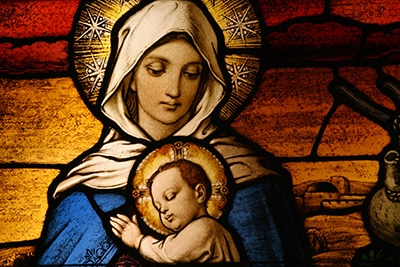
We Christians have cause to rejoice: Unto us a savior is born. But this good news is not for us alone. He seeks for us to welcome him to the point that he may take root in our lives and bear fruit through our words and deeds. He comes to us as our guest in hopes that we will welcome him as our Lord and our God.
Leonard J. DeLorenzo, Ph.D., works in the McGrath Institute for Church Life and teaches theology at the University of Notre Dame. You can subscribe to his weekly newsletter, “Life, Sweetness, Hope,” at bit.ly/lifesweetnesshope.

